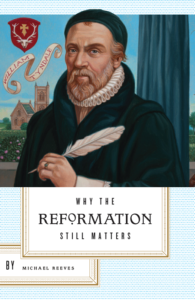 Article by Dr. Joel Beeke (original source here)
Article by Dr. Joel Beeke (original source here)
God sent forth the power of his Word in the Reformation of the sixteenth century. The Reformation served as a dynamic motivation and catalyst for change and progress wherever its influence reached. Many would credit Martin Luther as the driving engine that propelled the Reformation, but Luther said, “I did nothing; the Word did everything.” John Knox said, “God did so multiply our number that it appeared as if men had rained from the clouds.” How did the Reformation change the church and the world? Here are ten lasting fruits in which the Reformation made a significant difference.
1. The Word of God
The Reformers recognized the Bible as God’s written Word, and the supreme rule of faith and life for both the individual believer and for the life of the church. Here is the great starting point for understanding the aims, dynamism, and achievements of the Reformation. As part of the revival of learning connected with the Renaissance, the Western church recovered the knowledge of the original languages of the Bible. For the first time in many centuries, her scholars and teachers were able to read the Hebrew Old Testament and the Greek New Testament, and examine the extant Latin translations of the Bible in the light of the original. If you want to call yourself an heir of the Reformation, then you must be a student of the Bible. Read the Word of God and meditate on it daily. Cultivate a systematic understanding of the Bible’s teachings. Compare Scripture with Scripture. Never walk away from private devotions, family worship, or a sermon without taking hold of some particular truth and applying it to your soul.
2. The Gospel of Grace
The Reformers recovered the authentic gospel of salvation by grace alone through faith in Christ alone, to the glory of God alone, and proclaiming it to the ends of the earth through zealous evangelism. They taught that sinners are saved as Christ graciously works in them by His Word and Holy Spirit, convincing them of their sin and misery, and leading them to faith in the sacrifice of Christ on the cross, offered once for all, as the only ground of their salvation. Justification from the guilt of sin is not the distant goal, but the beginning of life in Christ. Good works are fruits that accompany justification, and only serve to confirm it. Justification is by faith alone, through Christ alone. Salvation is the gracious, free gift of God, “not of works, lest any man should boast” (Eph. 2:9). What Luther and the other Reformers discovered was that Rome had exchanged the true gospel for a false one. According to Rome, salvation was achieved by slow degrees and hard work, by receiving the sacraments and by doing such good works as the church required or directed. Sinners must atone for their sins by doing penance in this life and suffering the fires of purgatory in the next, calling on saints and angels for help, and cherishing the hope of full salvation only in the far distant future. Some degree of comfort was afforded to the faithful by the sale of “indulgences,” promissory notes issued by the church forgiving or “indulging” some part of the debt of sin owed to God. This “gospel according to Rome” was a message to inspire fear of wrath, not faith in Christ.
3. Experiential Piety
The Reformers enlivened the church worldwide with a deep conviction of the fatherly sovereignty of God through Christ, which results in a deep, warm, sanctifying, experiential piety or godliness that moves believers to commit their entire lives to His praise. One of the most compelling proofs of this assertion is the Heidelberg Catechism. Nothing is stated in an abstract or purely theoretical way. The very first question is intensely personal and experiential: “What is thy only comfort in live and in death?” Time and again the practical use or personal benefit is pressed: “What doth it profit thee now that thou believest all this?” (Q. 59).
This pressure persists to the last sentence of the Catechism: “Amen”––that is, the “Amen” of the Lord’s Prayer—“signifies that it shall truly and certainly be, for my prayer is more assuredly heard of God than I feel in my heart that I desire these things of Him” (Q. 129).
Subsequent generations of Reformed pastors and teachers took up this concern and developed it, as Christian experience and the strengths and weaknesses connected with it, received close scrutiny, careful analysis, and thorough exposition.
4. Old Paths
The Reformers preserved, exposited, and defended the ancient Christian faith through preaching and sound literature as the system of doctrine taught in God’s Word. The Reformers found support for their formulations of the Christian faith in the writings of the ancient church fathers. They saw themselves as the true heirs of historic Christianity. The Roman church had added to the biblical faith and obscured the gospel of justification, but there remained many essential truths of true Christianity as summarized in the Ecumenical Creeds. Though mired in layers of corruption, the gold of apostolic Christianity had not been utterly lost.
The Reformed faith was given to the world not as something new, but only a return of the faith, worship, and order of the apostolic church. It is popular today to cast off all tradition in order to cultivate a religion based on “me and my Bible.” Much contemporary Christianity is superficial and without deep foundations, and so very unstable. However, this is not the Reformation principle of Scripture alone, but a corruption of it. We do not reject tradition in itself, but tradition that is not subordinate to the Bible.
5. The Head of the Church
The Reformers reasserted the crown rights of Christ as King over the nations and the only Head of the church. This resulted in a church where all is done in subjection to God’s Word and in relation to the triune God rather than in subjection to man’s desires. The Reformers soon found themselves at odds with the hierarchy of the church, and in particular with the Pope. Over the centuries, the Papacy had advanced its claim to dominion over the worldwide church and over the kings and princes of Christian Europe. In a similar way, these kings and princes often claimed dominion over the church within their realms. Not infrequently, these divergent views led to fierce and bloody conflicts.
The Reformers found themselves fighting a two-front war, as the Pope used all his power to suppress the Reformation, and hostile kings and princes resisted and punished attempts to reform the church in their territories. Against both, the Reformers exalted Christ as the only Head of the church in heaven and on earth. Where they prevailed, the church was delivered from the twofold tyranny of the Papacy and the state.
6. Christian Freedom
The Reformers established the freedom of the Christian from tyranny in the church, the rights of citizens under the rule of law, curbing the powers of kings and nobles, and enabling the rise of representative democracy in the form of constitutional monarchies and republics. Upholding the supreme authority of Scripture, they dealt a deathblow to the medieval theory of the divine right of kings. All estates of the nation, including the king, are subject to the law of God and the laws of the state. Each citizen lives under the law’s protection, enjoying the liberty secured by subjection to God and to Christ. None but God has power over the conscience, and the calling of magistrates is to “do justice for the helpless, the orphan’s cause maintain; defend the poor and needy, oppressed and wronged for gain.”
This idea of kingship broke upon sixteenth century Europe as a revolutionary thunderbolt. A long struggle ensued to curb the excesses and abuses of kings, free the church from interference by the state, and establish the rule of law in Protestant Europe. It is no coincidence that representative democracy flourished best in lands and nations where the Reformed faith was most deeply rooted. The habits of democratic self-government were acquired by many citizens in meetings of congregations, consistories, classes, sessions, presbyteries, and synods.
The modern deliberative assembly is the brainchild of Presbyterianism. We should cherish our political freedoms and use all lawful means to preserve them. The rule of law, rights of all human beings, and covenantal accountability of leaders to God and the people are precious biblical principles. However, we should also remember that no political freedom has a stable foundation unless the church remains grounded in its freedom in Christ. Unless Christians walk in our blood-bought freedom from the dominion of sin, we cannot expect society around us to preserve civil liberty. Moral degeneration corrupts political freedom into a mask for any tyranny that promises to gratify a people’s passions.
7. Vocations for the Common Good
The Reformers recast the state as a commonwealth, promoting the dignity of labor, encouraging commerce, and increasing wealth among all classes, while curbing the excesses of unregulated capitalism and providing for the care of the sick and the poor. In the view of the Reformers, a well-regulated state ought to provide for the common good. All should thrive together, walking agreeably in decency and good order. Everyone has a stake in the life and well-being of the nation. No man is granted freedom to do as he pleases, without regard to the laws of God and the state. Such is the idea of the state as a commonwealth.
Reformed Christianity played a major role in the eradication of serfdom and the abolition of slavery, though, sadly, for some Reformed Christians these measures seemed too radical to be endorsed. According to the Reformed idea of vocation or calling, the common laborer came into his own as an image-bearing servant of God. Reformed doctrine sanctifies all of life, and resists attempts both ancient and modern to draw a line between the sacred and the secular. Men of wealth are called to use their wealth for the good of others and for the cause of Christ.
The restoration of the office of deacon meant that measures were taken in hand to care for the sick and lighten the burden of poverty on the poor. The communion of saints, each one employing his gifts for the advantage and salvation of the others, welded Reformed communities together as forces for benevolence, civic improvement and social progress.
8. Marriage and Child-rearing
The Reformers established the Christian home on the principles of Scripture, in which marriage is understood as a reflection of the Christ/church relationship; where husband and wife covenant with each other to walk in God’s ways; and parents, to rear their children, who are loaned to them by God. Casting out the medieval cult of celibacy, the Reformers embraced and exalted marriage in the Lord as the norm for the Christian life.
The Christian family is counted as the basic unit of the church and the foundation of society. In no better way can the mystery of Christ and His church be honored and enacted before the world. The children of believers once more became the heritage of the Lord, loved and nurtured, called to faith and repentance, confronted with Christ’s claims upon their faith and obedience, and schooled in the “true and perfect doctrine of salvation” taught in the Reformed churches.
9. Arts and Sciences
The Reformers rekindled the spirit of inquiry, founding schools, academies, and universities; disseminating knowledge; encouraging research and exploration; enabling many discoveries and producing many valuable inventions. Exalting God as Maker of heaven and earth, believing that man was created in God’s image, and valuing the creation as God’s handiwork, Reformed Christians have been stirred to seek out the laws of the universe and to realize much of the great potential built into the world as God created it. Believing that knowledge is essential to life and happiness, Reformed Christianity fostered the development of universal education.
A large chapter in the history of Reformed Christianity in the United States is the history of the founding of schools, school systems, and institutions of higher learning wherever Presbyterian and Reformed immigrants and settlers established their new homes and churches. The need for a well-educated ministry lay at the heart of this enterprise, but side by side lay the concern for an educated laity, that all might profit from the ministry of the Word.
10. The True Worship of God
Perhaps, above all, the Reformation promoted true worship. For them to worship God, whether privately or publicly, was to bow down before His majestic glory, and in spirit and in truth to bring Him, in and through Jesus Christ and in accord with Scripture, the honor and praise that belong to Him alone. Calvin said that the Christian faith turns on two main hinges: how we are saved, and how we should worship God.
Reformation worship turns away from the saints as heavenly mediators and encourages people to draw near to God the Father through the sole mediation of God the Son by the power of God the Holy Spirit. It simplifies the sacraments (from seven to two), purges the service of unbiblical rituals and imagined sacred objects, and restores the people to their function as a holy priesthood. It makes the Holy Scriptures both the rule of worship and its content as the church reads the Word, prays the Word, sings the Word, preaches the Word, and sees the Word in baptism and the Lord’s Supper.
Conclusion: Soli Deo Gloria
Here then, we have ten crucial ways that the Reformation—contra Rome—has blessed our world. What is the one great reality that all these things reflect? The diamond of the Reformation is the glory of God. The Reformation was about the centrality of God—the supremacy, sovereignty, holiness, goodness, and mercy of God in His triune being. The spirit of the Reformation, if you boil it down to its distilled essence, is to love God by faith in the grace of Christ, as He is revealed in the Scriptures.





